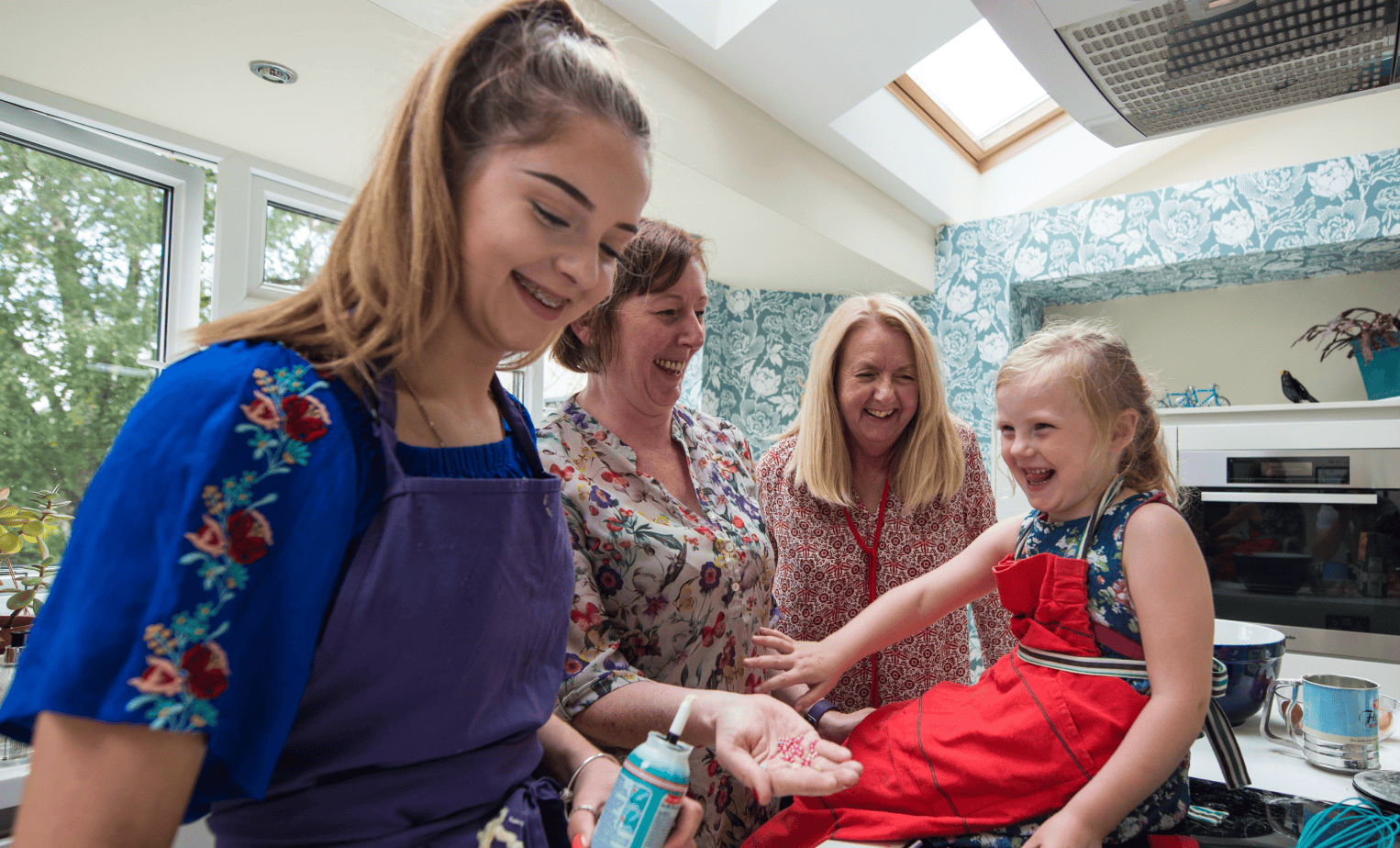What we know about foster carers
At To the Moon and Back Foster Care, we know that our own fostering families motivations to foster are similar to those above and subsequently that the biggest motivations to foster are altruistic.
What we hear and what appears to be reflected in the research (State of the Nation 2019) is that foster carers want to be seen as equals, feel a part of the perceived professional team and feel valued for the work they do. We agree with the Fostering Network who stated that “foster carers are supervised, trained, skilled and experienced – and ought to be well respected, sufficiently remunerated, offered ongoing training and properly supported”.
Sadly, we have in the past had to reassure families, following negative comments made by professional colleagues, that as foster carers they are part of the professional team and as an agency, we strongly advocate on behalf of foster carers to be included in professional meetings and decision making. Sadly, according to statistics, every year the fostering sector needs to replace the existing workforce of foster carers at a rate of 10-12%, all before addressing the continued shortfall of around 8000 families. But it’s not just the external professional team that influences the foster carer’s feelings of being valued. Recent research showed that up to one in ten foster carers have considered transferring to another fostering service because they were unhappy with the support and service from their agency. However, they had not transferred out of concern with the transfer process.
When approached by foster carers considering transferring their approval to foster to our agency, they are often nervous, have lots of questions and subsequently wary of making the move to a different service. Amongst the reasons for not transferring have been concerns about having to go through the assessment process all over again, and sadly, concerns that foster children may be taken off them. Seemingly their lack of trust in the system sees them resorting to “better the devil you know” and staying where they are, accepting they are unlikely to resolve issues and will never have the improved service they would prefer and, in our opinion, deserve.
The reality of fostering
We acknowledge and appreciate that some views of fostering can be idealistic and some adverts for fostering can be misleading. Fostering a child is demanding and a responsible role. Successful foster carers develop great levels of knowledge and skill. But it so often starts with a real sense of wanting to do something worthwhile, making a difference to a childs life. At To the Moon and Back Foster Care, we are honest and open about the needs of children who come in to care. Children who are unable to continue living with their family, will have experienced adverse childhood experiences (ACEs). There is a wealth of knowledge, research and evidence to show that this has a profound impact on children of all ages and there is no child that comes into the care system without having experienced an element of trauma. We believe that every foster carer and member of staff should be trained from the very start, to understand the impact of toxic stress, loss, separation, abuse and neglect on children. As an agency we realise that everyone of us, at some point in our lives, will have experienced some traumatic events and that we all benefit from kindness and support from those around us. We believe that we cannot expect families to provide care to traumatised children without the knowledge, tools and support to do this well. We work using some key principles of therapeutic parenting and as such all of our social workers have a high level of skill and knowledge in this area, which helps foster carers to feel successful.
“The fostering task requires carers who can become ‘therapeutic parents’ to looked-after children in a way that promotes the child’s developmental recovery, often after abuse, neglect and trauma”.
Bristol University Compassion Fatigue Research
To the Moon and Back Foster Care was founded with the intention to be different. We have developed a core team of like-minded people who appreciate the value of being in a good relationship with foster carers and support teams around the child. We work openly and transparently, with our foster carers and build trust that enable foster carers to feel safe, secure, and valued. We provide a trauma informed approach that supports foster carers to understand the impact of trauma on the children they care for and develop their skills to support the child to connect with them and go on to fulfil their true potential. We want our foster carers to feel successful and part of the professional team around the child. We have invested in the building of the relationship with our foster carers. Our supervising social workers operate with no more than 10 families which enables them to make close relationships with the foster carers. We know that foster carers can feel like they are in a goldfish bowl with everyone looking in. We work closely to build trust so that foster carers can be open in their discussions without feeling judged, all of which adds to our foster carers feeling safe and supported.

The findings of Bristol University’s research highlighted “Almost without exception, the foster carers in the focus groups felt that they had not been adequately prepared during the three-day preparation programme and their home study. As one carer said, ‘fostering is about normalising the most extreme behaviours and pretending it’s a normal life, and it just isn’t a normal life at all really’.
Those who have been fostering for a while, often acknowledge that they are always learning, and that each child is different, and their approach may have to change depending on the individualised needs of the child. Successful foster carers remain curious and show empathy for the child’s experiences and in turn our team work in the same way to support them.
Foster carers are the safe base for children in their care and as an agency we are the safe base for the foster carers. Dr Karen Treisman says wellbeing leads to well doing! When a foster carer feels supported and successful in their role, they will more likely achieve greater outcomes with the children they care for and with their life in general.
Fostering is rewarding – what families tell us
We work with some very inspirational foster families. Their perceived rewards of fostering are humbling and encouraging.
“The moments when you can see happiness in a child’s face and know you have helped to create an environment for them to flourish”.
Foster carer at To The Moon and Back Foster care
“You’ve got to look for the little things. One little child was probably with us six months before they smiled, and it was just like the sun came out. Because sometimes it’s hard, very hard, and you’ve got to look for the little things that make you think it’s worth carrying on”.
Compassion fatigue research Bristol University
“Amongst a mountain of despair comes a bright light of hope and an incredible need for love from a child”.
Foster carer at To The Moon and Back foster care
“The one person I keep going for is her … I love her and that’s what makes it worthwhile. Looking after her is 95% hard work and 5% reward, but that 5% reward makes every day that’s hard, worthwhile. ”When a child confides in you with an experience or opens up about their emotions, it is so rewarding to gain a child’s trust”.
Foster carer at To The Moon and Back foster care
So what can we do to help, when it is not feeling great?
None of us should be surprised by how fostering can leave families feeling. Young people who have experienced trauma, abuse, or neglect, have strong feelings that they struggle to regulate. Many have grown up in families where they have not been shown how to respond to their strong emotions in safe ways. Our foster children show us how they have been cared for in the past, by the way they express their hurt, trauma and neglect. They are not always able to regulate their complex emotions and therefore will express their feelings through their behaviour that we expect carers to try and understand, contain, and live with.
What we find sad and evidenced by the research on foster carers and compassion fatigue, is how little some professionals think or talk about the impact of fostering on families without an element of blaming the families for lacking in something, (resilience, skills support network, understanding… the list goes on).
At To the Moon and Back Foster Care, as a trauma informed team, we expect our team to subscribe to the way we work, advocating for foster carers and working to build a close professional relationship that benefits the foster carer and enables them to feel that we are watching out for them and thus provide them with a sense of security and belonging.
Foster carers we feel, cannot be supported effectively unless we are talking safely about trauma and what it does to young people, but equally, to them and their family. By “talking safely” we mean, in a safe trusting relationship where foster carers can be honest about their feelings and fears, without feeling judged.
Foster carers who transferred to us, have given permission for us to share their stories of their previous agency.
I had to readjust to being supported, having had to do everything myself before in my previous agency. There were issues surrounding support, my first agency was focused on “heads on beds” and it wasn’t’ at all child centred. We never wanted to be in a position where we felt we had nowhere to turn to for day-to-day support, we became involved, through our own research and study, with an external support service, funded by ourselves. There were issues surrounding support, my first agency was focused on “heads on beds” and it wasn’t’ at all child centred. We never wanted to be in a position where we felt we had nowhere to turn to for day-to-day support, we became involved, through our own research and study, with an external support service, funded by ourselves. I think it is hard in fostering, you are generally on your own and support groups never really happened ….which made it even more isolating for us.
The research undertaken by Bristol University reflects these thoughts, with further sad and shocking quotes from foster carers.
I’ve been there with children when you’re just meeting the basic needs, and you’re doing what you think they need, but you’ve taken on their trauma, and actually you can’t cope with that as well as looking after this person, so we’ve put a lid on it. We can’t take any more in that glass, so you literally are protecting yourself. Most foster carers felt that the social work professionals supporting them did not generally have the appropriate knowledge and understanding of issues of attachment and trauma, its effects on children and the challenges of caring. As a result, the support provided did not meet their needs.
Why don’t families just move to a more supportive and trauma informed service?
In the research undertaken by Fostering Network in 2019 only 53% of foster carers rated their service provider as good or excellent. One in ten families had considered transferring but didn’t. The biggest reasons given for not moving included feeling that the transfer process took too much time and effort and that their long-term placed child would have to leave them if they moved. One family apparently stated “I am redoing the assessment, but it has taken eight months just to get references!” Also mentioned as part of the report were delays to transferring caused by spurious concerns raised by the foster carers agency, alongside threats of deregistration, resulting in their new agency often halting or delaying the process. We believe this is unacceptable and a sad indictment of how some agencies see the value of foster carers within the sector. Foster carers have a right to change agency, so much so, that protocols are in place to support the process, ensuring that foster carers are treated with respect and the children in their care are put at the centre of the decision making. It is important that the transfer process is undertaken swiftly once a foster carer has formally indicated their decision to leave their agency, so that the carers can remain focused on the care of the child.
We acknowledge the dilemma of many foster carers who speak to us about transferring. We appreciate the fear some have of moving to another service only to find that nothing is different. In The State of the Nation Report, one family stated “We had to redo everything! References from family and friends, they met with them and interviewed them, they looked at our bank accounts, they asked intimate questions about our marriage and family relationships, they went through the whole invasive process again, from scratch.
It is acknowledged that the transfer process has to be thorough, but there is so much that can be done better. We work hard to make the process of transfer, meaningful and valued by the foster carer, using the time to reflect and be developmental alongside the legislative processes which are purposefully rigorous and therefore unavoidable.
One foster carer that transferred to us, in the autumn of 2020, said that she realised her previous assessment had gaps in it and that they had to be addressed but acknowledged that her initial dread, before starting the assessment process, was not justified as it had been quite enjoyable.
The cost of not transferring when feeling unhappy
We believe that there is a cost to the wellbeing of foster carers who, despite feeling so unappreciated, decide to remain where they are. As a result, we feel that there is a cost to the child being cared for by them.
One of our favourite trainers, Dr Karen Treisman, states “relational trauma requires relational repair”. This relies on there being a positive relationship with all parties and can only happen when there are safe relationships modelled throughout the organisation. We support our foster carers to care for children with relational trauma through relational repair. Our foster carers are the secure base for the child to explore the world safely. Our supervising social workers are themselves, supervised using a relational approach, so that they too then become the secure base for the foster carer. The relational culture of our organisation is open and conscious of the fact that even in great relationships conflict can arise. We proactively seek feedback and reflect with foster carers to try to improve systems and processes and thus our relationships. We are focused on the children in our care, thus we are focused on our foster carers, because if they feel good, the children will more likely achieve their goals in life.
Our supervision process considers working with trauma and enables issues, like the sharing of honest feelings that arise as a result of caring for children, to be openly discussed. We appreciate that sharing these feeling can feel risky to foster carers and leave them feeling vulnerable and judged as being unable to cope. We feel it is necessary to respond to a foster carers feelings with sensitivity and enable them to feel safe to explore what can be improved proactively. Just imagine, how would it be if you felt safe as a foster carer or a social worker in your supervision to explore these feelings which arise as part of the day to day work. We are told by foster carers who experience this type of supervision that they feel “topped up”, “heard” and “truly supported”, sometimes also relieved that what they are feeling is a normal part of fostering. We truly believe that this is what every foster carer should be getting as part of their support package.
We acknowledge that the feelings that children raise in foster carers can give insight into a young person’s needs. We have children for example, who engender despair and pain in our foster carers and children who leave our foster carers feeling unusually sad and tearful. This bears no reflection on the carer’s shortfalls, rather evidences what is going on for the young people and that they may be projecting this onto the foster carers and the family. It gives us all clues as to how we might need to support children and therefore is an essential conversation we should be having. By having this conversation regularly, it potentially reduces compassion fatigue in foster carers.
“Compassion fatigue can be described as the emotional residue, or strain of exposure to working with those suffering from the consequences of traumatic events. It differs from burn-out but can co-exist. Compassion Fatigue can occur due to exposure on one case or can be due to a “cumulative” level of trauma.”.
Figley, 1995
We like particularly how Figley describes how secondary trauma occurs, he states “We have not been directly exposed to the trauma scene, but we hear the story told with such intensity, or we hear similar stories so often, or we have the gift and curse of extreme empathy and we suffer. We feel the feelings of our clients (children). We experience their fears. We dream their dreams. Eventually, we lose a certain spark of optimism, humour and hope. We tire. We aren’t sick, but we aren’t ourselves.”
This we hold true in our foster families and social workers who are empathic and sensitive to traumatised children. It should be spoken about and to not do so is damaging to foster carers health and wellbeing and ultimately the children they foster.
What we know, is that families who are not being supported by other professionals to recognise the impact of fostering on carers, is that the carers can feel judged, and criticised. We hear families saying that they were offered solutions to issues that were basically behaviour management tools which they knew would be unlikely to have a long-term impact on their child. We have seen foster carers throughout our careers, who have become isolated, perceived as challenging and difficult, simply because they respond to criticism, solutions and guidance from professionals, in what are sometimes deemed as negative ways. One foster carer who, when described as being challenging, thanked the professional for the feedback. They knew that in their challenge of professionals they were acting as true advocates for a child whose needs were not being understood. However, when perceived as challenging, foster carers may not be given the reassurance that they are doing their job, and instead be left with negative feelings rather than being able to discuss it without feeling judged.
In the research carried out for a fostering service by Bristol University, they found “Foster carers also attributed lack of support to individual social workers’ lack of respect and empathy, which resulted in the carers not being trusted, their expertise being ignored and a lack of partnership working. Many foster carers also talked about social workers wanting to ‘solve’ problems rather than simply listening and being empathic, and this is not what they needed”.
What we know about our social workers is that they too need empathic listening and supervision that supports them with the trauma that they work with. We end up otherwise in a cycle of all the professionals replicating the chaos of the families from where the children may have come, this manifests as blame, criticism and harsh judgements being made on other professionals.
“Some foster carers felt judged and blamed by social workers for the difficulties they experienced in caring for traumatised children. Feeling judged led to a reluctance to ask for help and concerns from carers that if they were honest about the way they were feeling they might get deregistered. Lack of support is likely to have contributed to the moderate to high levels of burnout and secondary traumatic stress, and moderate to low levels of compassion satisfaction which many foster carers reported”.
As a foster agency we believe we have a responsibility to:
- provide the right leadership and agency culture which encourages the building of trusting relationships with everyone in the team but especially the relationship with our foster carers, enabling everyone to feel safe about being honest and open about their feelings
- emphasise the priority of providing meaningful and individualised support of foster carers that they themselves value, recognising that we are all different and sometimes processes and approaches need to be reviewed to fit the needs of individuals
- actively listen for signs of tension in a non-judgemental way, so that it can be discussed and the tensions relieved
- advocate for foster carers to be treated with respect and recognised as part of the professional team around the child, challenging on the carers behalf when the need arises.
- promote best practice, ensuring that our foster carers are informed about the impact of childhood trauma not only on the child but also on themselves.

The transfer process can be a very positive experience and we have many testimonials to support the work we do to make the process supportive especially where there are tensions with the agency the foster carers are leaving. One foster carer said of us “All Form F assessments can feel invasive, but Moon and Back were very sensitive and understanding in their approach.”
Another transferring family said that they had found the process with us “much more straightforward” than their previous assessment and said “clearly the assessor had been able to get a lot from our files in advance, it had been surprisingly much more plain sailing than the initial assessment”. Furthermore, they felt that because they were already foster carers they knew more than the first time and therefore everything was more understandable and therefore more enjoyable.
We are particularly sensitive to the transferring foster carer. We recognise that the decision to change agency is one that isn’t taken lightly. We treat any transfer to us, as an opportunity to reflect on the care being provided and offer a new space to reconsider support, development and training that may enhance that care. It doesn’t have to be an assessment that repeats the earlier process, but it needs to be rigorous and evidence based to show what has already been achieved and what more could be done with the right tools, resources and support.
Often attributed to Einstein, “continuing to do what you have always done, hoping things will get better, is a form of insanity” or as we have already said, in fostering “comes at a cost”. When the motivation of the majority of foster carers is recognised to be altruistic, born out of a true desire to do good, we believe they deserve the right to be supported fully and feel safe, secure and valued for the great things that they do.





